CCEE SYMPOSIUM
HE WALKED BY THEIR SIDE (Luke 24:15)
Accompanying young people to freely respond to Christ’s call
28 – 31 MARCH 2017
CCEE SYMPOSIUM
HE WALKED BY THEIR SIDE (Luke 24:15)
Accompanying young people to freely respond to Christ’s call
28 – 31 MARCH 2017
During the Symposium, a number of speakers will take turns to share with the participants their reflections around the theme of the meeting.
The speakers, all of them top level, will represent bodies of the Vatican, bodies of CCEE, or bodies of the Catholic Bishops’ Conferences in charge of the youth ministry. Of course, even young people themselves, and experts, will give their contribution.
We invite you to discover the list of the speakers.
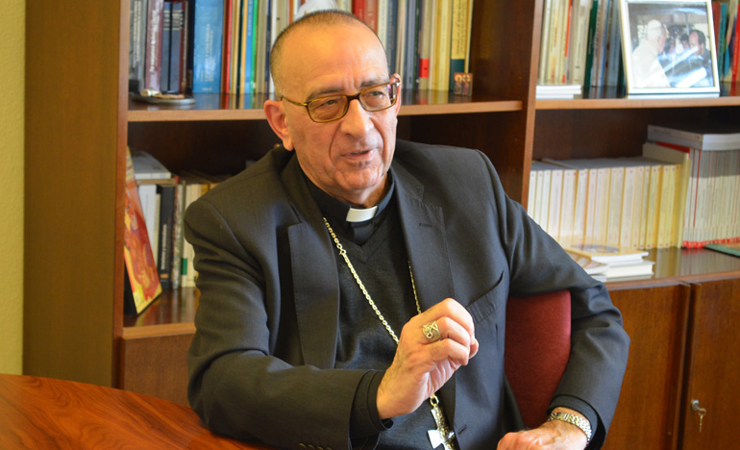
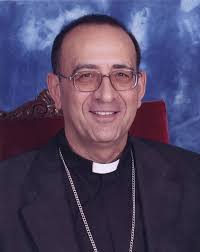
Mons. D. Juan José Omella nace en la localidad de Cretas, provincia de Teruel y archidiócesis de Zaragoza, el 21 de abril de 1946. Estudió en el Seminario de Zaragoza y en Centros de Formación de los Padres Blancos en Lovaina y Jerusalén. El 20 de septiembre de 1970 recibía la ordenación sacerdotal. En su ministerio sacerdotal, trabajó como Coadjutor y como Párroco y entre 1990 y 1996 como Vicario Episcopal en la diócesis de Zaragoza. Durante un año fue misionero en Zaire.
Cargos pastorales
El 15 de julio de 1996 fue nombrado Obispo auxiliar de Zaragoza. Fue ordenado Obispo el 22 de septiembre de ese mismo año. El 27 de octubre de 1999 fue nombrado Obispo de la diócesis de Barbastro-Monzón, de la que tomó posesión el 12 de diciembre de 1999. Entre el 24 de agosto de 2001 y el 19 de diciembre de 2003 fue Administrador Apostólico de Huesca y entre el 19 de octubre de 2001 y el 19 de diciembre de 2003, también Administrador Apostólico de Jaca. El día 8 de abril de 2004 es nombrado Obispo de la diócesis de Calahorra y La Calzada-Logroño. Tomó posesión de la diócesis el 29 de mayo del mismo año. Es también Consiliario Nacional de Manos Unidas.
El 31 de mayo de 2013 fue investido Prior Honorario de la Virgen de Valvanera por el Capítulo de Caballeros debido a su labor con la peregrinación de la Virgen por los diferentes municipios riojanos con motivo del Año de la Fe. El 6 de noviembre de 2014 la Santa Sede hacía público su nombramiento como miembro de la Congregación para los Obispos.
Otros datos de interés sobre Mons. Omella
En la CEE es miembro de la Comisión Episcopal de Pastoral Social desde 1996. De 2002 a 2008 fue Presidente de esta misma Comisión Episcopal. El 13 de marzo de 2014, en la CIII Asamblea Plenaria, fue elegido de nuevo presidente de la Comisión Episcopal de Pastoral Social.
Greetings as hosting Church
Main Celebrant at the Holy Mass
4:30pm March, 28 - Opening and greetings session
9:00am March, 31 - Holy Mass
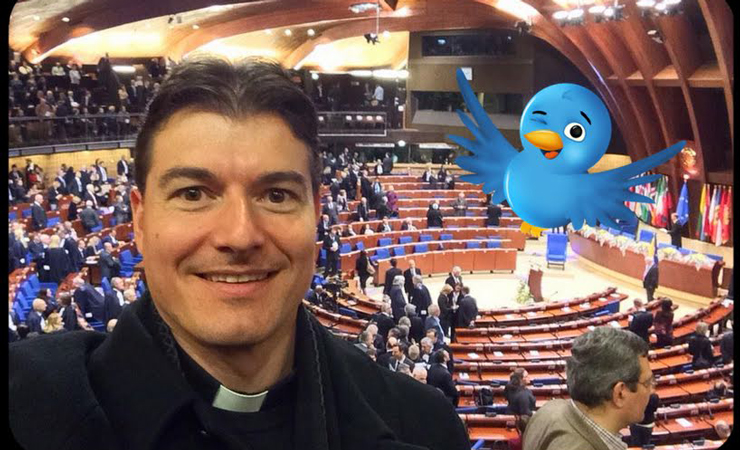
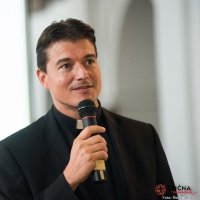
Rev Michel Petrus Remery (4 January 1973) was ordained priest in the diocese of Rotterdam on 5 June 2004. He studied architecture at Delft University of Technology, where he graduated in 1996. He worked as Project Manager at the Royal Airforce Infrastructures Department (1996-1997) and as Engineer-Director of a Tebodin and Shell project in Estonia (1998-1999). He studied theology at the Pontifical Gregorian University, where he gained a Licentiate in Dogmatic Theology, examining the liturgy in particular (2006). He subsequently gained a Doctorate with a thesis on the link between liturgy and architecture, published under the title “Mystery and Matter” (2008).
He was a member of a consultative committee at the Holy See’s Internet Office on the use of new media and young people (2004-2006). From 2006-2012 he worked in three Dutch parishes, with particular emphasis on pastoral work with young people. He has organized and led pilgrimages with young people to Rome, Paris, the Holy Land, Surinam, Poland, and the World Youth Days in Toronto (2002), Cologne (2005), Sydney (2008) and Madrid (2011).
He was a Collaborator at the Apostolic Nunciature at The Hague (2006-2012). Since 2008 he has been a Research Fellow at the Faculty of Catholic Theology of Tilburg University focusing on academic research on the link between liturgy and architecture.
Since 2012 he has has been Vice Secretary General at CCEE. He speaks Dutch, English, Italian, French, German and Spanish.
The path towards the Symposium and presentation of the programme
Sagrada Família: Beauty, Art, Architecture and Liturgy
4:30pm March, 28 - Opening and greetings session
4:30pm March, 30 - Beauty and accompaniment session
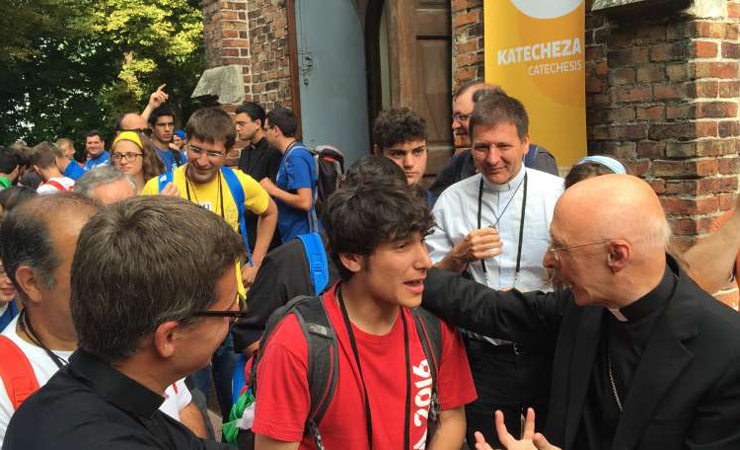
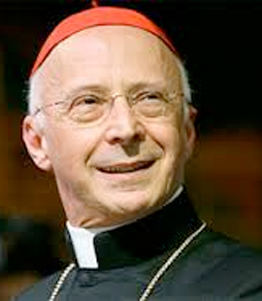
Main celebrant at the Holy Mass for the Families
Closing Address
7:30pm March, 30 - Holy Mass
12:00pm March, 31 - Final Session
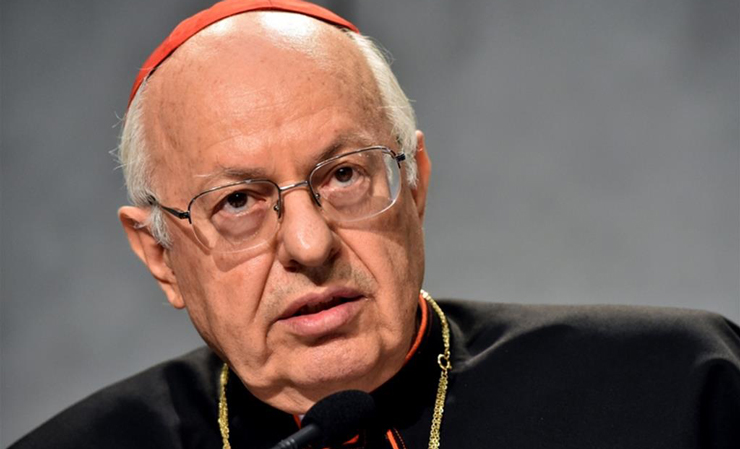
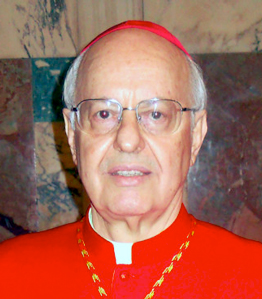
Cardinal Lorenzo Baldisseri, Secretary General of the Synod of Bishops, was born in San Pietro in Campo, Barga, Italy, on 29 September 1940.
He entered the seminary in Pisa, where in addition to theology and philosophy he also studied piano. He was ordained a priest on 29 June 1963. He holds a license in dogmatic theology and a doctorate in canon law.
In 1971 he entered the Pontifical Ecclesiastical Academy where he graduated two years later. He also studied at the Pontifical Institute of Sacred Music and then studied polyphony and sacred music with Domenico Bartolucci. When he entered the diplomatic service of the Holy See in 1973 he was sent to Guatemala and El Salvador as an official. One year later he was promoted to secretary. Subsequently he worked in the nunciatures of Japan, Brazil, Paraguay and France. Between 1986 and 1991 he served at the pontifical representation of Zimbabwe. In 1991 he was sent to Haiti, which was in serious political and social turmoil including a coup d’état.
On 15 January 1992 he was appointed titular Archbishop of Diocletiana and Apostolic Nuncio to Haiti. He received his episcopal ordination on 7 March of that year. He returned to Haiti on 28 March during a time of great difficulty: the country was experiencing conflict, social tension and violence, including against the Church. He remained there until 1995, when he was appointed Apostolic Nuncio to Paraguay – a country which was transitioning to democracy. In 1999 he was appointed Apostolic Nuncio to India and Nepal, and in 2002 as Nuncio to Brazil.
In 2012 he was called to Rome and began serving as Secretary in the Congregation of Bishops. Later he was appointed consultor to the Congregation for the Doctrine of the Faith and Secretary of the College of Cardinals.
On 21 September 2013 Pope Francis entrusted him the General Secretariat of the Synod of Bishops.
Created and proclaimed Cardinal by Pope Francis in the consistory of 22 February 2014, of the Deaconry of Sant’Anselmo all’Aventino. (St. Anselm on Aventino).
Member of:
Accompaniment of young people and vocations: towards the Synod 2018
10:00am March, 31 - Conclusions

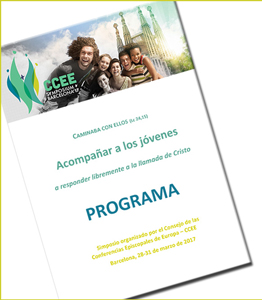
3:30 -
3:00PM – 4:30PM
4:30PM -
4:30PM – 5:00PM
His Grace Juan José Omella Omella, Metropolitan Archbishop of Barcelona
His Eminence Card. Vincent Nichols, Metropolitan Archbishop of Westminster, CCEE Vice President
His Eminence Card. Antonio Cañizares Llovera, Metropolitan Archbishop of Valencia, Vice-President of Spanish Bishops’ Conference
Fr Michel Remery, CCEE Vice General Secretary
5:00PM -
5:00PM – 6:00PM
Analysis of the questions raised in the reflection aid document: Which questions are the most important ones at this moment and how ought we to accompany young people today.
His Grace Marek Jedraszewski, Metropolitan Archbishop of Kraków, President of the CCEE Commission Catechesis School University
6:00PM -
6:30PM – 7:00PM
Multimedia presentation on the challenges, problems and joys of young people today in Europe.
Young people from Barcelona
7:00PM -
7:00PM – 8:30PM
Celebrant: His Eminence Card. Antonio Cañizares Llovera, Metropolitan Archbishop of Valencia, Vice-President of Spanish Bishops’ Conference
9:00AM -
9:00AM – 9:30AM
Celebrant: His Eminence Card. Ricardo Blázquez Pérez, President of Spanish Bishops’ Conference
9:30AM -
9:30AM – 11:30AM
Four young people from different European backgrounds reflect on accompaniment on the basis of their experience.
Fr. João Chagas, Youth Section, Dicastery for laity, family and life
4 young participants
11:30AM -
11:30AM – 1:15PM
Round table with representatives from the five sectors Catechesis, School, University, Youth and Vocations looking at the Church practice of accompaniment at different stages of life.
His Grace Jean-Claude Hollerich, Archbishop of Luxembourg
5 national directors
Ms Agnė Pinigienė, Catechesis
Mr Ernesto Diacco, School
Rev. Šimo Maršic, Universita
Mr Paul Metzlaf, Young People
Rev. Christopher Jamison, Vocations
1:15PM -
1:15PM -02:15PM
Celebrant: His Lordship Oscar Cantoni, Bishop of Como, President of the Commission CCEE for Vocations
3:30PM -
3:30PM – 5:00PM
What is needed for good accompaniment? How can we be open and respectful of human freedom whilst also leading and guiding? Samples of accompaniment.
Sister Lola Arieta, Carmelite Sister of the Caridad de Vedruna, expert in the accompaniment of young people
5:30PM -
05:30PM – 07:15PM
Echo of what preceded: exchanging experiences, looking for new ways to approach accompaniment
7:45PM -
7:45PM – 8:45PM
Together with young people from Barcelona
9:00AM -
9:00AM – 9:30AM
Celebrant: His Grace Đuro Hranić, Metropolitan Archbishop of Đakovo-Osijec, President of the section Catechesis of the Commission CCEE Catechesis School University
9:30AM -
9:30AM – 10:00AM
Why a market with best practices? What is the importance of examples? How can you let yourself be inspired by others?
His Grace Rino Fisichella, President of the Pontifical Council for the Promotion of the New Evangelisation
10:00AM -
10:00AM – 12:00PM
Exposition of a wide range of chosen best practices. Criteria are that these are instructure and constructive and/or can be repeated in other contexts.
12:00PM -
12:00PM – 2:00PM </>
Small groups divided by languages:
– What did you discover this morning? What possibilities do you see for new initiatives?
– What possible collaboration do you see between the five sectors?
– What would you like to propose to the Synod 2018?
02:00PM -
2:00PM – 3:30PM
Bishops and delegates from the five sectors eat in five separate groups, divided according to sector and language
04:30PM -
4:30PM – 5:45PM
An example of alternative ways of accompanying people. In this sense the architect Gaudi had his own way of accompanying people. Contemplation on the role of beauty
Rev. Michel Remery, Research Fellow Liturgy and Architecture at the School of Catholic Theology of Tilburg University
Rev. Prof. Armand Puig, Scholar of the work of Gaudì
Sig. Etsuro Sotoo, sculptor of the work of Gaudì
05:45PM -
5:45PM – 7:30PM
7:30PM -
7:30PM – 8:30PM
Celebrant: His Eminence Cardinal Angelo Bagnasco, Metropolitan Archbishop of Genova, CCEE President
9:00AM -
9:00AM – 10:00AM
Celebrant: His Grace Juan José Omella Omella, Metropolitan Archbishop of Barcelona
10:00AM -
10:00AM – 11:00AM
His Eminence Lorenzo Card. Baldisseri, Secretary General of Synod of Bishops
Debate with the assembly
11:30AM -
11:30AM – 12:00PM
A shared attempt to summarise the answers they heard to the questions raised in the reflection aid document.
Fr Leon Ó Giolláin SI, Secretary of the Section University of the Commission CCEE Catechesis School University
Sr My-Lan M. Nguyen, Delegate for the Federation of Catholic Schools in Switzerland
Fr Emil Parafiniuk, Coordinator of EVS / CCEE commission for Vocations
Ms Jona Draçini, Representative of the young people of Albania
Fr Luc Mellet, Secretary of the Section Catechesis of the Commission CCEE Catechesis School University
Mgr Duarte da Cunha, CCEE General Secretary
12:00PM -
12:00PM – 12:30PM
His Eminence Cardinal Angelo Bagnasco, Metropolitan Archbishop of Genova, CCEE President


Purpose. The following text is intended to promote a Europe-wide interdisciplinary reflection in preparation for the CCEE Symposium on the accompaniment of young people today. It is not intended as a final document: it is, rather, a catalyst for discussion and as such, it poses questions, rather than offering answers. Through dialogue, sharing, and prayer the Symposium will hopefully arrive at some answers and come to some conclusions. The loose structure in twelve points aims to freely stimulate dialogue and leave open the possibility of various different kinds of interpretation.
Addressees. The document is addressed to those who will attend the symposium: in the first place bishops and national delegates of the five sectors catechesis, school, university, youth and vocations. Together with young people and other experts they will seek to formulate answers to important contemporary questions. The questions posed in this document are the result of consultations with young people, and are formulated in the professional ecclesiastical language of the addressees.
Aim. The aim of the 2017 Symposium is to seek ways of engaging with and confronting the current situation in Europe as we accompany young people after the manner of Jesus with the disciples on the way to Emmaus (LK 24:13-35).
Focus. The focus of the symposium will be on young people from adolescence to young adulthood. Attention will also be given to the importance of children and cooperation with families, as well as the preparation of young people for their future vocation, many of whom will form families of their own. There is no one size fits all “young person”: each in their uniqueness needs to choose from various pastoral proposals, what suits them and their path with God, best.
Process. This document is the result of extensive consultation. In September 2015, a committee representing the five sectors convened in Malta and drafted a document, which was discussed during the first half of 2016 at separate meetings with the national delegates from all five sectors. As many as possible of their comments have been incorporated in the present text, drafted in Madrid by another small committee representing the five sectors.
Preparation. This document can serve within the European Bishops’ Conferences as a tool for joint reflection between the delegates of the five sectors. It is therefore suggested that all delegates within a given Bishops’ Conference come together before the symposium. The 2017 Symposium will replace the usual CCEE meetings of catechesis, school, university, youth and vocations for that year. This will allow each Bishops’ Conference to nominate representatives from each of the five pastoral areas in question.
Best practices. We invite you to propose good examples of initiatives which could be taken as models of successful pastoral activities and best practice. The aim is to offer a broad and diverse series of workshops in order to stimulate new ideas and possibilities, as well as to encourage and incite a new enthusiasm for the accompaniment of young people. A selection of the proposals will be chosen, in an effort to cover all sectors and areas of Europe. We invite everyone to send their proposals for best practices and success stories before 1 December 2016 to the address: ccee@ccee.eu
1. Jesus himself gives a great example of accompaniment on the way to Emmaus: he walks with the disciples, asks questions, and listens (LK 24,13-35). On that basis he subsequently starts to teach and helps the disciples to interpret their lives in the light of God’s Word. This prepares them to recognize his presence in the breaking of the bread and marks the beginning of a new way of following Jesus, that it, with the full, heartfelt desire to bring his message to everyone in a voice loud and clear. Accompaniment of young people is more than just spiritual guidance: it involves walking with the other in all aspects of his or her life: in family life, in catechesis, in youth ministry, at school and university, in promoting vocations…
Accompaniment is walking side by side with Jesus as our Master and model of Christian friendship. He is present, he is sympathetic to what is happening in the lives of the persons he accompanies, he is compassionate, he sees beyond their restricted vision, he encourages questioning, he challenges, he provokes, he opens minds up to a broader, liberating vision. He helps people to see themselves in the light of God, to recognise his presence in the Sacraments, and thus he widens their horizons and points towards what is truly essential. Jesus walking by our side leads us into the fullness of life. How do we critically assess our mode of accompaniment? How do we ensure that Christ remains present in our accompaniment?
2. Christians are to be the soul of the world. The early Church was on fire with conviction about what it had to offer to the world, i.e. Christ crucified and risen. Our task today is to rediscover this and to be faithful to our calling. The Church is young because the Holy Spirit is ever young.
/p>“The great danger in today’s world, pervaded as it is by consumerism, is the desolation and anguish born of a complacent yet covetous heart, the feverish pursuit of frivolous pleasures, and a blunted conscience… That is no way to live a dignified and fulfilled life; it is not God’s Will for us, nor is it the life in the Spirit which has its source in the heart of the risen Christ” . Given that the European continent is becoming more and more secularised, how can we live within this secularised society as people on fire with faith and leaven for others?
3. Jesus is walking with us in a Europe characterised by a Christian tradition open to the diversity of religions, cultures, economic situations and technological advancements. This provides great opportunities as well as unique challenges, for example in relation to some key issues of our time such as the migration of peoples, the ongoing threat of extremism in its various forms, ‘life’ issues, issues around personal identity and employment… How, then, are we to live constructively as Christians, with such diversity? How are we to help young people to do so? How can we present the faith as a worthwhile way of life and – in extreme cases – worthy of our life?
Christianity is called to be a bridge between persons and cultures, and between civilisations. Down through the ages, the unifying message of Christ’s love, which seeks actuation in all human relations, has contributed to the building of bridges where previously this seemed impossible. Jesus models this bridge-building by entering fully into our real human experience in order to invite us to a place where he can reveal himself to us, and thus help us to find our true selves at a personal and communitarian level. At the same time we note an increasingly visible globalisation of the world, which is most evident in youth culture with its uniformity in speech, in tastes, in life-style. Furthermore, an unwillingness to accept diversity outside of the common model can be observed. What do young people ask from the Church in this context? What contribution can the Church make to this situation, with its universal and unifying message which values the uniqueness of each individual and of every culture?
4. Reflecting on our Christian identity, we cannot avoid asking questions on the nature of the person in general and the importance of moral conscience. Important questions that every person needs to answer in order to find his own identity, questions such as: Who am I? Where do I come from? Where do I belong? What must I do? How can I live a fully human freedom? As with the disciples of Emmaus, Jesus walks by our side, enters into conversation with us, respects our freedom and helps us to choose well, enlightening us with his Word.
His invitation to embrace the fullness of life seems to be in contrast with what is sometimes called the “culture of death”, evident in, for example, the high rate of suicide among the young, abortion, euthanasia and assisted suicide, and everything else that negates human life in all its grandeur and limits. In order to live life to the full, life has to be understood as a process of integration. Too often, different “sectors” of life are compartmentalised: affectivity, social relationships, faith, family, culture, political ideas, work, and free time. How can we be truly ourselves, live “holistically”, and overcome fragmentation?
5. We cannot do it alone; we need others to support this process of integration. The other is a gift for me and I for him. We become ourselves only in relationship with the other. On the way to Emmaus Jesus helped the disciples to rediscover himself in the breaking of the bread and in the community they had left behind in Jerusalem. Jesus invites us to be part of a unique Christian community centred on himself, which draws us into that deeper communion which is celebrated in a special way in the Sacraments, beginning with baptism and finding full realisation in the Eucharist.
The fullness of life offered by Jesus meets us in our loneliness, our fragmentation, alienation, lack of communion, desire for love and for life. He instituted the community of the Church precisely to find in him and in our relationships with one another built around him, the answer which awakens and surpasses our deepest human longings.
6. We cannot underestimate the importance of family as the domestic Church in the formation for this kind of communion. It too is threatened by brokenness and fragmentation. We take our lead from Pope Francis in our pastoral response to these challenges, which must also include families and persons on the peripheries .
The family is central in Christian life. It is the place where community living is modelled and learned. The family, in collaboration with the school and the parish, is called to accompany people in love – that love which is the driving force of human formation in children and young people. How can we develop their awareness of being persons inevitably in relationship with others? What can we do to accompany families? How can we help young people who come from wounded families?
7. Every person seeks true happiness, yet it is well attested that many young people today experience various forms of depression, disillusionment and despair as they negotiate real-life situations such as, for instance, loneliness, poverty and unemployment. It is precisely the kind of negative feelings people today experience that Jesus encountered in his disciples on the road to Emmaus. He took seriously their questions and their entire situation, and helped them to see beyond and face the future with hope. How can we as Church announce his liberating message to the men and women of our time? What can we learn from those who suffer various forms of disability, including spiritual ones? How can we help people to recognize the great “yes” to true life which the Church promotes, while taking into account the fact that sometimes the Church’s message is experienced as an apparent negation of personal freedom, joy and success…?
When power, competitiveness, sex, money, career… become idols, they lead only to a counterfeit happiness and fail to fulfil the person. Individualism denies the communitarian dimension of our humanity and can only result in alienation from self and others. Jesus proposes an alternative that brings us from darkness into light. How can we live out his teaching, his call to reach out to the other in love and service, and thus bring hope to every corner of our continent?
8. “The joy of the Gospel fills the hearts and lives of all who encounter Jesus. Those who accept his offer of salvation are set free from sin, sorrow, inner emptiness and loneliness. With Christ joy is constantly born anew” . When the Church lives out this message with conviction it leads to the transformation of persons and of society. Joy is a gift of the Lord. If joy is to remain consistently present in the person, attention to the interior life, to personal and communitarian prayer, is necessary.
How can we become more zealous as a missionary community in witnessing to this truth of Christ’s gift of joy? The one who has experienced this joy will not be able to keep it to himself, but will want to propose it to the world as the fundamental path towards true happiness. How can our lives proclaim the joy that Christ gives us? How can we help young people to keep this joy alive in their hearts?
9. The Church has a particular love for young people, in all their rich diversity. It recognizes their many gifts: generosity, solidarity, openness, dedication, honesty, inquisitiveness… It tries to discern the action of the Holy Spirit in their lives such as in their desire to serve the world through the various forms of voluntary service they undertake. An area of particular importance for young people is that of the affections which touches on friendship, one’s relationship with oneself, intimate relationships with others and, of course, vocational discernment. This also includes one’s relationship with the animal world and inanimate things. How can we facilitate a proper discernment which distinguishes between a love that is purely physical and true love which involves the gift of self and receptivity to the other and which mirrors the love of God?
How can we be true to ourselves in our accompaniment of young people and at the same time use language accessible to them? How can we better use the modern means of communication which they use so frequently for exchanging and gathering information? How can we help them to recognise that beauty expressed, for example, through art and music, can be a pathway to God?
10. To accompany is to walk together, like Jesus with his disciples on the way to Emmaus. Accompaniment is first and foremost about being present and listening. It is about the capacity to receive in his or her totality the person one accompanies. Above all, it means respecting the freedom of the person, allowing the Creator to deal directly with the creature and the creature with his or her Creator, as St. Ignatius says. It is about facilitating their discovery of God’s Will in their lives. It is also about facilitating the making of good decisions made in freedom. Answering God’s call is truly liberating. This holds for marriage and for all forms of consecration to God and the Church.
The one accompanying also needs to be accompanied, whilst knowing that the Holy Spirit is the guide par excellence. How can we allow Jesus to walk by our side and also help us to walk like him alongside those whom we wish to accompany? Asking questions, making suggestions, proposing a way forward, and being attentive to the person’s response, are all part of an accompaniment which is led by the Holy Spirit. How can we share our own experience of faith and of life which has endowed us with a broader view of what human life is all about? How can we accompany people so that they become who they are in light of the Creator? How do we lead them to a personal encounter with Christ?
11. It is important that we continually reflect on how we accompany young people so that we may continue to improve. Do we really listen to them or are we more apt to insist on our own point of view? Are we perhaps blinded by prejudice? Are we capable of discerning the action of the Holy Spirit in their lives? Do we do enough to have the requisite skills to accompany them adequately? Do we lead them to Christ? Do we fall into the temptation of measuring success in terms of results and numbers? Do we have the humility to which Christ invites us and which is particularly desirable in the work of formation and accompaniment and indeed, in our witnessing to God’s love?
Every serious accompaniment involves witness. Young people want to see in those who accompany them along the way, people of integrity. They need people of authenticity who themselves have a relationship with God – people of prayer, mature Christians who are also aware of their own limitations and fragility and who can lead them to Christ. People also who can read the signs of the times and enter into the historical moment and become involved. Faith is not an abstract idea. Witnessing has to do with the real life of people as with Jesus and his disciples: we enter into the joys and sorrows, successes and failures, desires and disappointments, of the women and men of our time, giving meaning and purpose to their experience. How can we be such a witness – not drawing attention to ourselves, but rather pointing to God?
12. Christ is the only true evangeliser. He is the Way, the Truth and the Life. Through his Word and his redeeming grace, he leads man to the Father. Our continent needs to rediscover its roots in Christ and his Gospel. Consequently, each and every activity of ours ought to have an evangelising aim. As with accompaniment, evangelisation must begin where people are, namely: immersed in the culture of our times, with all its attendant questions and concerns. When we see the needs of society, we feel obliged to respond with the mercy of Christ: visiting the sick, offering companionship and support when needed, working for the common good and for culture, seeking justice and peace, and opposing the globalization of indifference.
How can we find a language that expresses meaningfully the message of the Gospel in a way that everyone can understand? How can we accompany others while announcing and witnessing to our commitment to Christ? How can we ourselves live and help young people to live the life of communion around Jesus present in the sacraments, in fraternity, in charity, in missionary activity? How can we have the same zeal and enthusiasm as the disciples of Emmaus in proclaiming the risen Christ?
The best practices are available in the languages provided by the participants